 Crime
Crime  Crime
Crime  Technology
Technology 10 Hilariously Over-Engineered Solutions to Simple Problems
 Miscellaneous
Miscellaneous 10 Ironic News Stories Straight out of an Alanis Morissette Song
 Politics
Politics 10 Lesser-Known Far-Right Groups of the 21st Century
 History
History Ten Revealing Facts about Daily Domestic Life in the Old West
 Weird Stuff
Weird Stuff 10 Everyday Products Surprisingly Made by Inmates
 Movies and TV
Movies and TV 10 Actors Dragged out of Retirement for One Key Role
 Creepy
Creepy 10 Lesser-Known Shapeshifter Legends from Around the World
 Animals
Animals 10 Amazing Animal Tales from the Ancient World
 Gaming
Gaming 10 Game Characters Everyone Hated Playing
 Crime
Crime 10 Terrifying Serial Killers from Centuries Ago
 Technology
Technology 10 Hilariously Over-Engineered Solutions to Simple Problems
 Miscellaneous
Miscellaneous 10 Ironic News Stories Straight out of an Alanis Morissette Song
Who's Behind Listverse?

Jamie Frater
Head Editor
Jamie founded Listverse due to an insatiable desire to share fascinating, obscure, and bizarre facts. He has been a guest speaker on numerous national radio and television stations and is a five time published author.
More About Us Politics
Politics 10 Lesser-Known Far-Right Groups of the 21st Century
 History
History Ten Revealing Facts about Daily Domestic Life in the Old West
 Weird Stuff
Weird Stuff 10 Everyday Products Surprisingly Made by Inmates
 Movies and TV
Movies and TV 10 Actors Dragged out of Retirement for One Key Role
 Creepy
Creepy 10 Lesser-Known Shapeshifter Legends from Around the World
 Animals
Animals 10 Amazing Animal Tales from the Ancient World
 Gaming
Gaming 10 Game Characters Everyone Hated Playing
10 Logical Explanations For Incredible Biblical Tales
The Bible is one of the most controversial books on Earth. Open it to any random page and you’ll find tale after tale of impossible feats, talking donkeys, and other stuff that seems to punch science square in the kisser. Or does it? It turns out that reason and religious miracles may not be quite as incompatible as people think. We’re not saying any of the following explanations are definitely true, but they sure are compelling.
10The Tower Of Babel Was A Gigantic Ziggurat
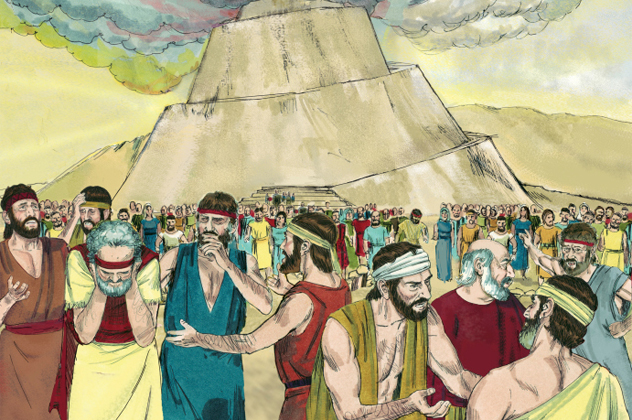
Even amid all the iconic tales of Genesis, the story of the Tower of Babel stands out. In nine short lines, it tells us how the uppity men of Earth decided to build a tower so big it could feature as a set piece in MI:5. To prevent that from happening, God messed up all their languages. Since we’d have probably noticed an ancient mega-tower in the Middle East by now, the story has to be a fable, right?
Well, a few years back, scholars got around to translating some very ancient cuneiform tablets. Believed to be about 2,500 years old, one of them contained a description of a giant ziggurat built by the Babylonian King Nebuchadnezzar II. At the time it was built, this huge, pyramid-like object would have been the biggest thing for hundreds of miles. But the real clincher comes from an engraving on the tablet describing how Nebuchadnezzar gathered “all the people of the world” to build his tower.
Thanks to inscriptions on walls across Babylonia, the ziggurat and its multilingual construction crew would have been known to everyone in the ancient Middle East—including the author of Genesis.
9The Red Sea Was Parted By A Hurricane
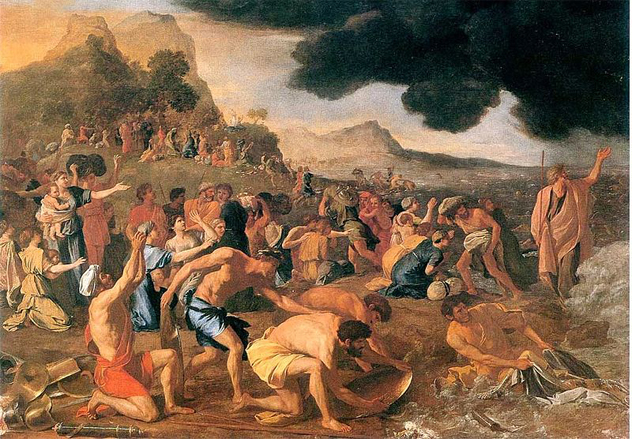
The story of Moses is one of the most famous parts of the Old Testament. Over four whole books, we watch Israel’s first prophet grow from an orphaned kid to a crotchety old man stomping around the desert. But it’s in Exodus where the amazing stuff happens—like when God parts the Red Sea to allow the Israelites to escape Egypt. What’s less well known is that this isn’t the only time such a miracle has occurred.
Seriously: In 1882, the deep waters at Lake Manzala unexpectedly parted, allowing a group of local fishermen to walk across. Rather than the hand of God, this was caused by something known as “wind set-down”—a fancy way of saying the wind blew just fast enough at just the right angle to create a temporary land bridge. When researchers applied this to what we know of the ancient Nile, they discovered that an easterly wind blowing at 101 kilometers per hour (63 mph) for 12 hours would have been enough to create a bridge lasting four whole hours. That’s easily enough time to get a gang of fleeing Israelites across.
But surely Moses crossed the Red Sea and not the Nile? Well, the Hebrew Bible actually specifies that they crossed the “reed sea”—and reeds are something the Nile has plenty of.
8Sodom And Gomorrah Were Destroyed By A Meteor
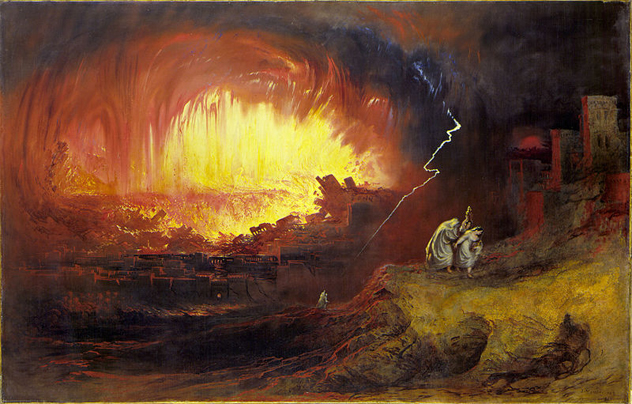
The fate of the five Cities of the Plain is so infamous that even staunch atheists will have heard of it. Sodom and Gomorrah, the immoral pits of sin, perished when they were firebombed by God.
Or were they? Over the years, several theories have been proposed for this rain of fire—and most of them favor space debris over God’s wrath. According to one, the Earth passes through a big cloud of meteorites every 2,500 years or so. With the last-but-one occurring around 2200 B.C., it neatly lines up with the time period when a real Sodom and Gomorrah could have existed. Since we know 40 city-states suffered huge—possibly meteor-related—catastrophes at that time, it stands to reason that the Cities of the Plain could have been among them.
A slightly different theory points to an ancient cuneiform tablet describing a low-angle asteroid impact in 3123 B.C. Although the rock itself crashed into Europe, the angle at which it impacted could have caused a superheated cloud of air to curve back over the Mediterranean and ignite the sky above the Levant, Sinai, and Northern Egypt. Every city on the ground below would have turned into an instant inferno. Sound familiar?
7The Apocalypse Was A Mystical Drug Trip

The Book of Apocalypse (aka Revelation) is one of the least understood parts of the whole Bible. We’ve mentioned before how its meaning has eluded us for centuries, and some think there’s a very good reason for that. According to this theory, the whole thing is just a literal recording of a mushroom trip.
Now, we should stress that this is a fringe theory that we’d probably avoid completely were it not for two things. First, there is a scientifically proven link between use of psychedelic drugs and feelings of religious experience. And second, the brains of people undergoing religious experiences look very, very similar to those embarking on an epic Pink Floyd–style trip.
In other words, some scientists suspect religious feelings and hallucinations may be inextricably entwined in our brains. Add that to what we know about the ritual use of drugs in hundreds of religions and sects across history—from Hinduism to Islam to Mayan religions—and the idea that a book of the Bible was inspired by drugs begins to sound at least somewhat plausible. There’s even a school of thought which states that all religions arose as the result of ritual drug use. We’ll leave you to decide just how probable that really might be.
6Cain And Abel Is About Genocide
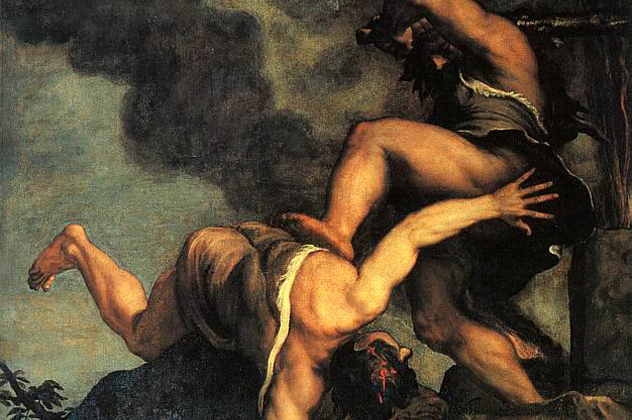
Coming right after the Fall of Man, the story of Cain and Abel is like its gorier sequel in which humanity stoops lower than ever by creating murder. After farmer Cain’s offering to the Lord is rejected in favor of herdsman Abel’s, Cain kills his brother in a fit of blind rage. Although it seems like a simple tale, some think there’s something deeper at work. Some people think the whole story is a parable for humanity’s first genocide.
Only a few tens of thousands of years ago, we Homo sapiens were sharing our planet with Neanderthal man. Then, suddenly, Neanderthal man disappeared. There are plenty of theories as to why this might be. One is that our early ancestors slaughtered—and possibly ate—our competitors. And it’s just possible that an echo of that extermination survives in Genesis.
Like Abel, Neanderthals were herdsmen. Like Cain, humans were farmers. Is it possible that their story is simply a distorted folk memory of our earliest murder spree? We may never know.
5Egypt’s 10 Plagues Were Caused By Climate Change
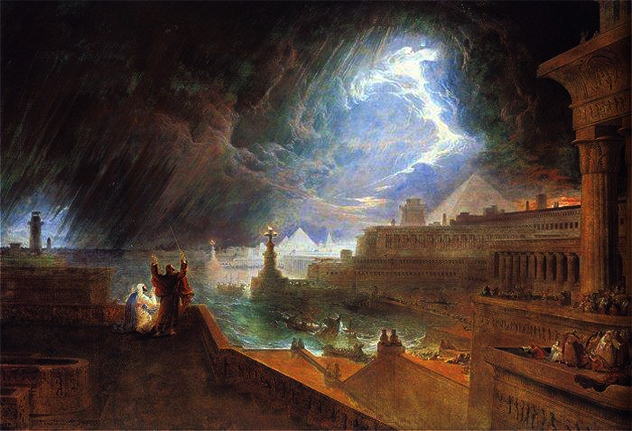
Only a couple pages before parting his sea, Moses bore witness to one of the Bible’s other great events: the 10 plagues of Egypt. Plagues of insects, rivers of blood, eternal darkness . . . how could scientists ever explain this away? Well, one theory is that they could have been caused by climate change.
Following decades of rain and good weather, a sudden shift to a dangerously dry climate apparently caused havoc in ancient Egypt. As the Nile stagnated, it would have triggered all sorts of nastiness—including swarms of mosquitoes and the eruption of blood-red algae across the river. Nearly all the “early” plagues—disease, boils, frogs—could have been caused by the stagnant river and insects, while the later ones may have been triggered by a distant eruption.
Roughly 3,500 years ago, the volcano-island Thera blew its top in an apocalyptic blast. With so much ash floating around the stratosphere, stuff like utter darkness and gigantic hail storms would be completely possible. To the Egyptian-hating Israelites, it would have looked like nothing short of God stepping in on their behalf.
4The Garden Of Eden Is About Agriculture
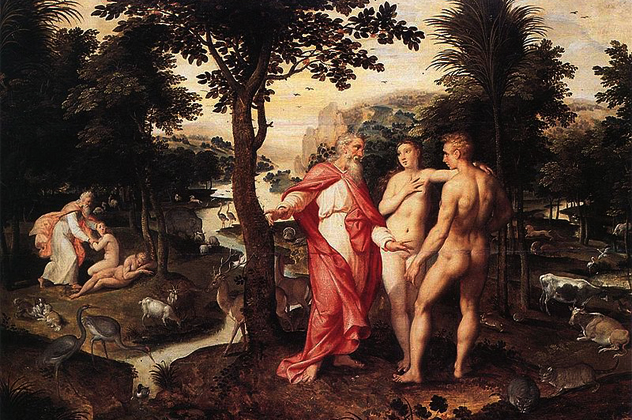
We’re all familiar with the Garden of Eden. A perfect place where man wandered freely with the animals, it was eventually lost forever when Adam and Eve were expelled. If most of us ever think about it, we probably assume that Eden is simply a myth. But one theory has a different interpretation: The whole story is a metaphor for humanity abandoning their hunter-gatherer culture.
At some point in our distant past, our ancestors got majorly into farming. Known as the Neolithic Revolution, this transition was what allowed us to create societies, cities, civilization, and the modern world. On the whole, it was clearly a good thing. In the short-term, though, it meant a transition from a world of roaming and plenty of free time to one of backbreaking labor, shorter life spans, and an increased chance of disease. It’s speculated that this culture shock made such a lasting impact on our collective memory that it later resurfaced in countless stories. Hence God condemns Adam to toiling in the fields as punishment for eating from the Tree of Knowledge.
3Noah’s Flood Was Caused By Melting Glaciers
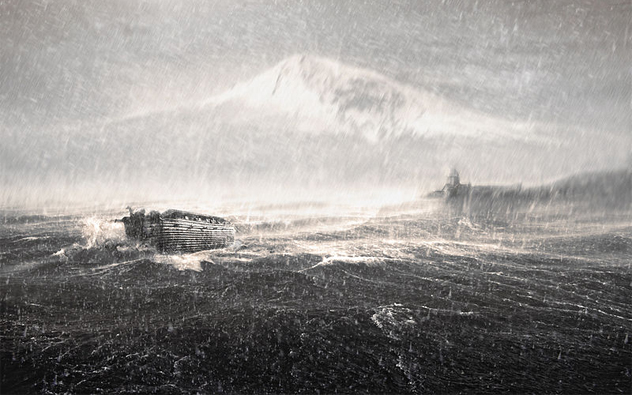
As recently as 10,000 B.C., most of what we would call the modern world was hidden underneath a layer of ice. Glaciers rolled across North America, Europe, and Asia and things were really, really cold. Then, a few thousand years before we’d get our heads around stuff like writing and the wheel, the planet began to warm up.
As the Earth got warmer, sea levels would have slowly risen. It’s theorized that, at that time, the Black Sea was a freshwater lake surrounded by farmland. Then, at some point in 5000 B.C., the Mediterranean rose high enough to come cascading over and flood everything.
According to the scientists behind this theory, the water would have come rushing in at 200 times the force of Niagara Falls and submerged some 150,000 square kilometers (58,000 sq mi) of land. For people living in the region at the time, it would have felt like the apocalypse. Thousands would have died, and any who survived would likely have assumed that they were spared by God. It’s now thought that the story of this mega-flood was preserved in oral histories of the region, eventually transforming into the Noah story we all know today.
2The Burning Bush Was On A Volcanic Vent

It’s the moment when Moses first realizes he’s been chosen by God—a bush bursts into flames before him without turning into ash. But physicist Colin Humphreys of Cambridge University in the UK thinks this miraculous event has a totally non-miraculous explanation. According to his theory, the bush just happened to be growing over a volcanic vent.
In an incredibly long book on the subject, Humphreys demonstrates how an acacia bush—endemic in the region—growing over a volcanic vent could have spontaneously erupted into flames due to escaping heat. Since acacia bushes are known for creating extremely good charcoal, one that ignited could well appear to burn without end, giving the impression that God’s spirit was nearby.
1Jesus May Have Walked On Ice
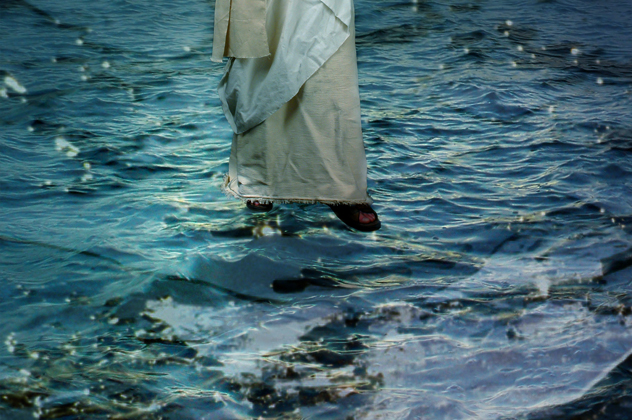
Aside from the resurrection, the most famous of Jesus’s miracles is likely the time He walked on water. But there’s a school of thought that claims no such thing ever happened. According to this theory, Jesus was really walking on ice.
That’s not to say that the entire lake was frozen—no one in their right mind would find that impressive. Instead, it’s thought that something known as “springs ice” caused sheets of thick ice to form right alongside open water. This usually occurs in freshwater lakes with warm saltwater springs running into them—conditions that perfectly describe the ancient Sea of Galilee. As far as the theory goes, Jesus could have walked out on a patch of hidden ice, even as His disciples were still floating on water.
Now, obviously this theory has a couple holes in it. In the Biblical story, Peter got out and did some water-walking alongside Christ, which raises questions about how he didn’t notice the gigantic ice sheet. Then there are some scientists who dispute the mechanism behind “springs ice.”
But that’s the beauty of these theories. With stuff that happened so long ago, we’re never going to get a definitive answer. All we can hope to do is trigger debate and make ourselves think seriously, with open minds, about the stories we grew up with. And that’s never a bad thing.








